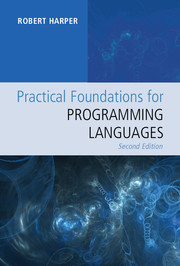Book contents
- Frontmatter
- Contents
- Preface to the Second Edition
- Preface to the First Edition
- Part I Judgments and Rules
- Part II Statics and Dynamics
- Part III Total Functions
- Part IV Finite Data Types
- Part V Types and Propositions
- Part VI Infinite Data Types
- Part VII Variable Types
- Part VIII Partiality and Recursive Types
- Part IX Dynamic Types
- Part X Subtyping
- Part XI Dynamic Dispatch
- Part XII Control Flow
- Part XIII Symbolic Data
- Part XIV Mutable State
- Part XV Parallelism
- Part XVI Concurrency and Distribution
- Part XVII Modularity
- 42 Modularity and Linking
- 43 Singleton Kinds and Subkinding
- 44 Type Abstractions and Type Classes
- 45 Hierarchy and Parameterization
- Part XVIII Equational Reasoning
- Part XIX Appendices
- References
- Index
44 - Type Abstractions and Type Classes
from Part XVII - Modularity
Published online by Cambridge University Press: 05 March 2016
- Frontmatter
- Contents
- Preface to the Second Edition
- Preface to the First Edition
- Part I Judgments and Rules
- Part II Statics and Dynamics
- Part III Total Functions
- Part IV Finite Data Types
- Part V Types and Propositions
- Part VI Infinite Data Types
- Part VII Variable Types
- Part VIII Partiality and Recursive Types
- Part IX Dynamic Types
- Part X Subtyping
- Part XI Dynamic Dispatch
- Part XII Control Flow
- Part XIII Symbolic Data
- Part XIV Mutable State
- Part XV Parallelism
- Part XVI Concurrency and Distribution
- Part XVII Modularity
- 42 Modularity and Linking
- 43 Singleton Kinds and Subkinding
- 44 Type Abstractions and Type Classes
- 45 Hierarchy and Parameterization
- Part XVIII Equational Reasoning
- Part XIX Appendices
- References
- Index
Summary
An interface is a contract that specifies the rights of a client and the responsibilities of an implementor. Being a specification of behavior, an interface is a type. In principle, any type may serve as an interface, but in practice it is usual to structure code into modules consisting of separable and reusable components. An interface specifies the behavior of a module expected by a client and imposed on the implementor. It is the fulcrum balancing the tension between separation and integration. As a rule, a module ought to have a welldefined behavior that can be understood separately, but it is equally important that it be easy to combine modules to form an integrated whole.
A fundamental question is, what is the type of a module? That is, what form should an interface take? One long-standing idea is that an interface is a labeled tuple of functions and procedures with specified types. The types of the fields of the tuple are often called function headers, because they summarize the call and return types of each function. Using interfaces of this form is called procedural abstraction, because it limits the dependencies between modules to a specified set of procedures. We may think of the fields of the tuple as being the instruction set of a virtual machine. The client makes use of these instructions in its code, and the implementor agrees to provide their implementations.
The problem with procedural abstraction is that it does not provide as much insulation as one might like. For example, a module that implements a dictionary must expose in the types of its operations the exact representation of the tree as, say, a recursive type (or, in more rudimentary languages, a pointer to a structure that itself may contain such pointers). Yet the client ought not depend on this representation: the purpose of abstraction is to get rid of pointers. The solution, as discussed in Chapter 17, is to extend the abstract machine metaphor to allow the internal state of the machine to be hidden from the client. In the case of a dictionary, the representation of the dictionary as a binary search tree is hidden by existential quantification. This concept is called type abstraction, because the type of the underlying data (state of the abstract machine) is hidden.
- Type
- Chapter
- Information
- Practical Foundations for Programming Languages , pp. 409 - 421Publisher: Cambridge University PressPrint publication year: 2016



